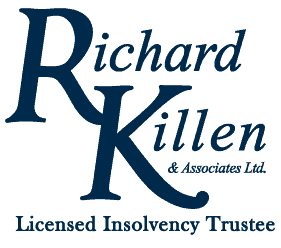How to Deal with Creditors during the Coronavirus Financial Crisis

If you are one of the hundreds of thousands of Canadians who only have CERB support payments to get you through this unprecedented time, and you have monthly debt payments to keep up with, the fundamental question is: How do you deal with creditors in this coronavirus crisis if you are no longer able to pay meet your debt payments?
Here are several things you need to know when making payments becomes hard or impossible:
- If you miss a monthly debt payment one of the first things you need to know is that your creditors have the right to take action to collect payment from you. This means they can call you, take you to court, sue you, and eventually garnishee your wages.
- Creditors will try to collect from you directly as soon as you miss a payment. They will begin with a simple overdue reminder notice. If you miss a monthly payment on your credit card, for example, your bank or credit card company will give you an overdue notice on your monthly statement. If it remains unpaid, this will escalate to phone calls, emails, and other forms of direct contact as long as the creditor is dissatisfied with the situation as it stands.
- You can expect to receive automated late payment notifications as these are system generated messages. It’s important to be aware that creditors will likely continue to send out written notifications of late payments so they can take legal action against you as soon as the courts open.
- If you have generally been current with your payments the good news is that other than the notice on your next statement, you will not likely see collection activities starting immediately after your first missed payment.
- If you have not responded to late payment notices or made a payment on your debt, and your debt is 90 days past due or more, lenders may decide to refer you to a collection agency. Because of COVID-19, this is not likely to happen in the immediate future as many collection offices are shut down or working with limited staff.
- If delinquency remains unresolved too long, the creditor may take you to court (sue you). This will involve filing a statement of claim with the court and serving this document on you..You will have 20 days to dispute the claim, which gives you time to deal with the situation. This too is not an issue right now as the courts are closed, which means creditors cannot start filing any legal action until the courts open again. But they can start the ball rolling in that direction now, so when the court opens for business again, things will move quickly.
- If you receive collection calls and you can’t pay due to a job loss from COVID-19, you should always simply tell the truth. Tell the collector that you’ve been laid off work, and are not able to make payments right now. Though you may run into someone where the compassion gene skipped his or her generation, most collection agents will be prepared to work with you rather than confrontationally against you.
- If a creditor has a garnishee order filed against your wages and your only income comes from CERB support payments from the government, don’t worry, these support payments cannot be garnisheed or applied to debt repayments. Creditors cannot obtain a court order to apply a wage garnishment on social assistance payments, government pensions or support payments. Garnishees apply only to employment income.
- However, if you have a bank account and owe money to that bank, on a credit card or a loan for example – then that bank can take payment out of your account without a formal garnishee and without your permission to apply to any overdue payment. To avoid this situation it would be a good idea never to do your banking where you owe any money. If you feel vulnerable right now due to the Coronavirus and want to change your deposit bank you may consider opening an account at an online bank.
- Finally, if you are in need of protection from your creditors’ efforts to force payment through garnishment or other collection activity, you do have the right to use the Bankruptcy and Insolvency Act and do a bankruptcy or a consumer proposal. In order to explore that option to see if it’s the right one for you, a meeting with a Licensed Insolvency Trustee like Richard Killen & Associates Ltd. will be the next step. During coronavirus time this is now possible by telephone or teleconference.
Communicate with your Creditors

The best way to deal with creditors during this coronavirus financial crisis is to talk to them. It’s crucial that you take action quickly and make the first move to contact them and find out what your lenders can do to help you. The key is to act quickly, as soon as you realize you may miss a payment.
The worst thing you can do is ignore your creditors. Lenders won’t know that you need help if you don’t tell them. Payment deferrals, loan extensions, revised terms or even reduced interest rates are all things your lenders can offer as a temporary solution. But they’ll need to assess your financial situation first. They will take into account your payment history, how soon you seek help and your recent credit behaviour and a number of other factors. If you’ve waited too long and have slipped too far behind with your payments they may not be able to help at all.
It’s important to keep your creditors updated with your circumstances, especially if your finances have been impacted by the COVID-19 crisis and you’re not able to keep up to date with your debt payments. As soon as you let your creditors know you need help, they will try to find ways to help you. So, don’t be afraid to reach out to them.
If you need help to communicate with your creditors about your debt, particularly in knowing what you can and cannot say, talk to us here at Richard Killen & Associates and we can guide you on how to go about dealing with them. We can also advise if you need to contact a creditor in writing. We can also contact your creditors on your behalf and negotiate a new arrangement to make debt repayments affordable for you.
Call us at 1-888-545-5365, or email us at lawrence@killen.ca or brampton@killen.ca and we can set up a free initial consultation on the phone or by email or video conference with you online. We are committed to providing full services in the midst of the coronavirus emergency.
Do I Need to Meet My Creditors?
The last people you want to meet when going through a bankruptcy in Ontario is your creditors, right? You know, the people who have been sending you notices, phoning you non-stop, garnisheeing your wages and generally making your life difficult.
What are the chances you will have to get face to face with people who definitely aren’t part of your fan club? The chances are very small. In our experience at Richard Killen & Associates, fewer than one in 100 personal bankruptcies will require such a meeting. The creditors have the option of requesting a meeting but rarely exercise this right, especially if yours is a “summary administration” (if your assets in a bankruptcy are valued under $15,000).
That said, there are two situations where a trustee must call a meeting of the creditors: If the Office of the Superintendent of Bankruptcy (OSB) tells the trustee to call one, or if creditors who are owed more than 25% of your total debt request one.
The main purpose of the meeting is to give your creditors a chance to learn all the ins and outs of your financial situation, and to give directions to the trustee on the administration of the estate, if they so choose. The creditors can also review the trustee’s preliminary report, review the OSB’s report, examine the proofs of claims of other creditors, vote on resolutions, perhaps appoint inspectors (to provide the trustee with direction and the authority to take certain actions) and so on.
While creditors can ask you questions about your finances, you don’t have to answer any queries that aren’t related to your financial situation past, present or future. You also have the right to bring a lawyer to the meeting, though this rarely done. The chairman (usually the trustee) keeps things on topic.
But, as we pointed out before, creditors aren’t quick to request meetings in consumer bankruptcies. They can usually find out what they need to know faster and easier by calling the trustee directly or sending him/her an email. Creditor meetings occur automatically in commercial bankruptcies, where the financial issues are often more complex and more creditors are involved.
While a meeting with creditors is nothing to look forward to, a meeting with Richard Killen & Associates will help you reduce your stress levels considerably. At your free consultation we will outline all your options, so you can meet your personal situation head on and take the first steps in getting your financial life back under control.
Informal Arrangements Need Full Agreement
One of the options in dealing with a debt crisis is an informal arrangement. This is essentially reorganizing the debts that you have with the creditors you owe the money to.
We’re not talking here about a consolidation loan. That’s different because you end up with only one creditor if can consolidate your debts. An informal arrangement involves renegotiating the debts you have with the creditors themselves. You still end up with the same creditors, but your payment obligations have been reduced. For instance, you could extend a term on a loan or change a credit card debt into a loan.
What Are the Alternatives in Coping With a Debt Crisis?
 No one wants to go bankrupt. It is the last resort when faced with insurmountable financial problems. But even if your payments are in arrears and you are getting collection calls, there are other options besides a bankruptcy, which we at Richard Killen & Associates are glad to explain. These include:
No one wants to go bankrupt. It is the last resort when faced with insurmountable financial problems. But even if your payments are in arrears and you are getting collection calls, there are other options besides a bankruptcy, which we at Richard Killen & Associates are glad to explain. These include:
Getting a Consolidation Loan
If you can qualify for a consolidation loan, you can bundle all your debts into a single package and make a monthly payment that will probably be lower than what you are faced with right now with all the individual payments. You can usually reduce interest and stretch out your repayment period. The trick is qualifying for the loan if your credit rating has taken a beating because of your financial difficulties. To get approved, you may need collateral, or a co-signor or guarantor – not always easy to find.
Making an Informal Arrangement
You can, perhaps, negotiate with creditors to reduce monthly payments. Or you might be able to get them to accept less than the full amount owed, if you have a lump sum payment you can make. In either case, you should use the services of a licensed trustee, lawyer, accountant or reputable credit counselling agency to do this, and beware of the many unscrupulous sorts out there poised to take advantage of your situation. Other pitfalls of this method include: the high degree of difficulty in conducting negotiations; creditors who can still sue you; no protection from garnishees; it doesn’t stop interest accumulation; and it needs to be accepted by all creditors before it can be effective.
Offering a Consumer Proposal
A consumer proposal is a legally binding agreement between you and your unsecured creditors to settle all your unsecured debts. It is filed with the government and managed by a licensed trustee, such as Richard Killen & Associates, under the supervision of the court. You will probably wind up paying back only a portion of what you owe – for instance 10, 20, or 30 per cent – and so get the debt relief you need without going bankrupt.
How this differ from the two options above? The three main advantages are:
- You don’t have to negotiate with each creditor separately.
- You only need a simple majority of the debts to be in favour, not all of them, to get it accepted.
- The creditors have to listen to you. If they ignore your offer they will be stuck with it, so you will have their attention.
In other words, you will be negotiating a settlement of all you unsecured debts from a position of more-or-less equality with your creditors. We usually don’t think of ourselves as being in that position with the banks and credit card companies, do we?
A proposal also stops all interest charges, halts lawsuits and garnishees, and does not require direct individual negotiations (the trustee handles this for you).
Everyone’s situation is different. To decide what is the best method of dealing with your debt problems, you need expert advice. At Richard Killen & Associates we offer a free assessment consultation, so you will have a clear picture of what your options are.
Stop Harassment by Creditors
 Debt collectors can be, uh, zealous in their pursuit of money owed. Stories of daily phone calls, threats, bothering friends and relatives, and late-night contacts abound. In some cases debt collectors have aggressively pursued ridiculously small amounts of money, and even gone after people who owe nothing at all.
Debt collectors can be, uh, zealous in their pursuit of money owed. Stories of daily phone calls, threats, bothering friends and relatives, and late-night contacts abound. In some cases debt collectors have aggressively pursued ridiculously small amounts of money, and even gone after people who owe nothing at all.
The point is, there are limits to what these agencies can do to collect cash. In Ontario, the Collections Agencies Act lays out the boundaries that, when crossed, constitute illegal harassment.
For example, a debt collector can’t make any calls to a debtor until six days after mailing written notice with the name of the creditor, balance owing on the debt and the identity of the collection agency.
They are also not allowed to make calls on statutory holidays, on Sundays, except between the hours of 1 and 5 p.m., or on any other day of the week between the hours of 9 p.m. and 7 a.m. And they cannot contact the person more than three times in a seven-day period.
If a debt collector does get you on the phone, they cannot threaten you, swear at you, lie to you or harass you. They cannot seize your assets until they have won a court judgment. They can only contact your employer to get your employment information, unless your employer has guaranteed your debt or the call is about a legal action, such as garnisheeing your wages.
And they can only contact your family, friends, neighbours and acquaintances once to get your address and phone number, unless these people have guaranteed your loan or you have given permission for them to be contacted (in a contract, most likely).
Read more about your rights dealing with collection agencies here. While it’s generally better to speak to a collection agency, rather than avoid them, to deal with the problem, you don’t have to talk to them if you don’t want to.
If they do harass you or threaten you or try to intimidate you in some way, they may be breaking law. You have the right to report them to the police or phone company, or file a complaint to the Ministry of Consumer Affairs.











